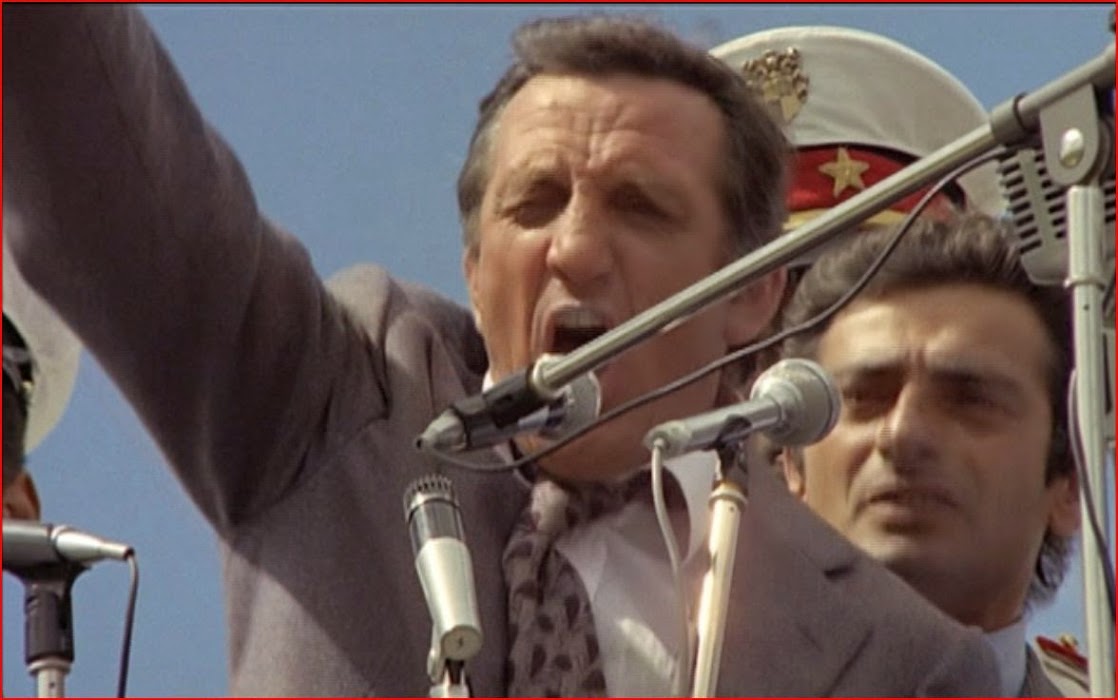 Claude Lelouch's L'aventure c'est l'aventure is France's answer to Otto Preminger's Skidoo: a heavyhanded comedy about oldschool gangsters adjusting to a radically new world. In less obscure terms, Lelouch's film is a send-up of radical chic. A bunch of dimwitted crooks -- Lino Ventura, playing an art forger, is the most high-functioning of them while singer-songwriter Jacques Brel is the other big name in the cast -- emerge from prison to learn that bank robbery, art forgery and other old standbys aren't where the action is anymore. The real action is political; all the old stuff is finished. Even the prostitutes are planning a general strike. Lino's son tells him that even cars are finished. Finding the lad's Molotov cocktail in his car, Lino accepts the premise and blows it up.
Claude Lelouch's L'aventure c'est l'aventure is France's answer to Otto Preminger's Skidoo: a heavyhanded comedy about oldschool gangsters adjusting to a radically new world. In less obscure terms, Lelouch's film is a send-up of radical chic. A bunch of dimwitted crooks -- Lino Ventura, playing an art forger, is the most high-functioning of them while singer-songwriter Jacques Brel is the other big name in the cast -- emerge from prison to learn that bank robbery, art forgery and other old standbys aren't where the action is anymore. The real action is political; all the old stuff is finished. Even the prostitutes are planning a general strike. Lino's son tells him that even cars are finished. Finding the lad's Molotov cocktail in his car, Lino accepts the premise and blows it up.

Lino's gang takes a crash course in radical politics, hearing talks from such extremes as uniformed Maoists to Salvation Army officers. The thing to do, they learn, is kidnap people in the name of some revolution or other. They start by pulling pop star (and eventually a movie tough-guy in his own right) Johnny Hallyday off the stage at one of his concerts after he sings the title song; Hallyday proves a most cooperative hostage. The gang then gets involved in an archetypal Latin American revolution, turning on revolutionary commandante Ernesto (Juan-Luis Bunuel, the director's son and a director in his own right) when he doesn't pay promptly. They kidnap a diplomat and impulsively play Russian Roulette with him while waiting for the ransom. They stage a successful hijacking, complicated only by their inept reading of an English ransom note. Finally they're living the high life until they're lured into a trap -- the bait's a boatload of topless girls -- set by the vengeful Ernesto, who wants his money back from them.


Eventually we return to the framing device of the gang's trial in Paris, but it's only a brief pause before the big finish as the boys make their break and flee to Africa, where they're feted as radical heroes. Each man takes a turn making nonsensical speeches as the masses cheer indiscriminately, living up to one character's early announcement that they were Groucho Marxists -- Skidoo covered this base by casting Groucho himself as a mob leader. Finally, there's no rest for revolutionaries, and our heroes are last seen sedan chair-napping the Pope, carrying their captive through the jungle and on to further adventures.

There are some funny ideas here and some decent moments of visual humor -- Ventura's facial expressions are priceless as he listens painfully to his cohort's labored rehearsals of his English for the ransom note -- but I suspect that a lot of L'aventure's humor is lost in translation. The whole point is the culture clash of gangsters and political radicals so the way the different sets of characters talk has to be a big part of the comedy that the DVD's subtitles don't really convey. The main point of the crooks' stupidity is made effectively enough with their compulsive gambling -- they take bets on which of them will crack as Ernesto tortures them one at a time -- and their idiotic attempt to seduce girls on the beach with their silly macho walks. But the comedy is silly rather than satiric and the film is fun but forgettable -- David Thomson didn't even list it on Lelouch's filmography for The Biographical Dictionary of Film. L'Aventure doesn't really deserve that sort of neglect, but it isn't exactly a vital document of its time, either. The impulse to satirize radicalism sometimes results in instant camp; if that intrigues you, this film will, too.
No comments:
Post a Comment